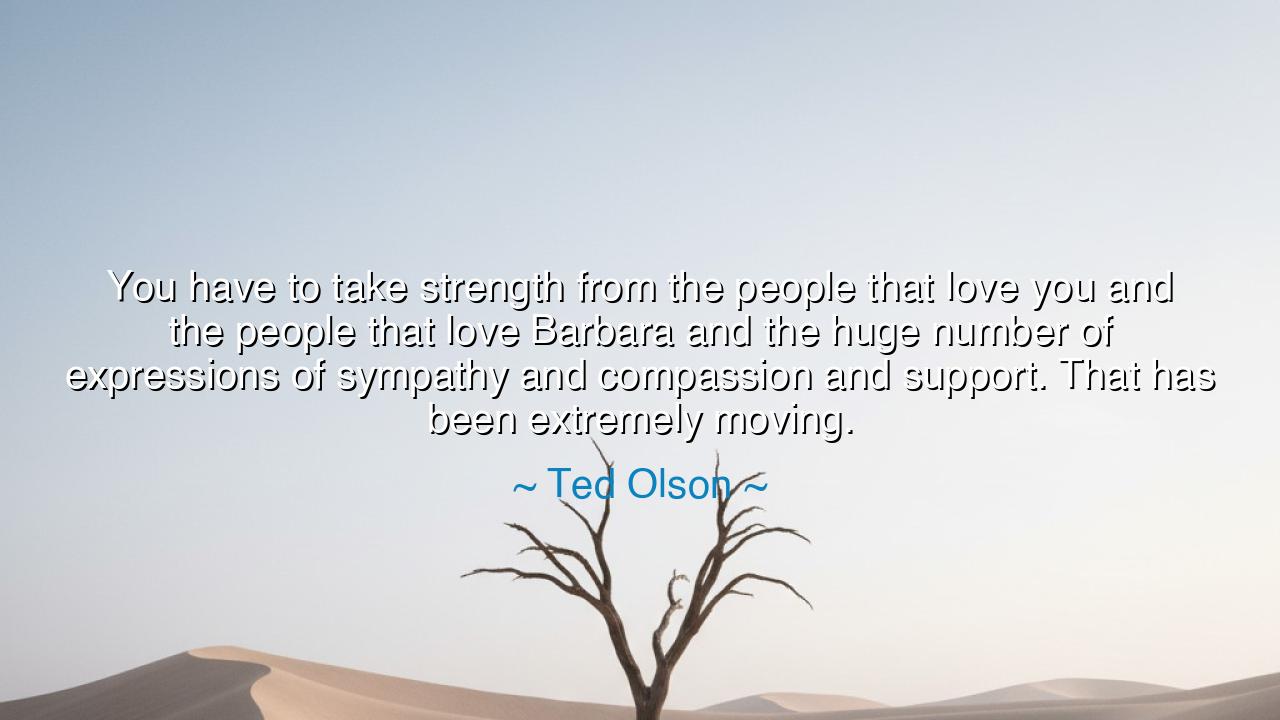
You have to take strength from the people that love you and the
You have to take strength from the people that love you and the people that love Barbara and the huge number of expressions of sympathy and compassion and support. That has been extremely moving.






In the labyrinth of life, where challenges and heartbreak often arise without warning, there is a deep truth that connects us all: the power of love, sympathy, and support. Ted Olson’s words, “You have to take strength from the people that love you and the people that love Barbara and the huge number of expressions of sympathy and compassion and support. That has been extremely moving,” remind us that in moments of sorrow, loss, and trial, it is the love and support of others that provide the strength we need to endure. Olson’s statement speaks to the human experience of relying on the goodness of others in our most vulnerable moments—a lesson as ancient as humanity itself.
In the ancient world, the concept of community support was foundational to both survival and healing. Greek philosophers like Aristotle recognized that humans are not meant to exist in isolation, but are inherently social beings, bound together by ties of friendship, sympathy, and shared responsibility. Aristotle’s Nicomachean Ethics emphasizes the importance of virtue in relationships, suggesting that true strength is found not in self-sufficiency, but in the mutual support of those around us. When facing hardships, it was not just personal willpower that guided individuals, but the compassion and empathy of friends, family, and community. Aristotle believed that the collective strength of a community could be a source of resilience in times of loss and suffering—exactly what Olson highlights in his reflection on the strength he derived from the love and support of others.
The Romans too, in their struggles and triumphs, recognized the power of community and the role of love in helping individuals face adversity. In Rome, a person’s family and friends played a vital role in their emotional and social well-being. Cicero, the Roman orator, often spoke of the importance of sympathy and emotional bonds in times of crisis. In his letters, Cicero found solace in the support of his friends and family, acknowledging that it was their love and caring presence that enabled him to endure both political and personal hardship. This reflection on the importance of community during times of trial echoes Olson’s sentiments: it is in the love of those who care for us that we often find the courage to keep moving forward.
Olson’s words also resonate with the teachings of Christ in the New Testament, where the concept of love and sympathy is central to the Christian faith. Jesus repeatedly taught that the greatest commandment is to love one another, and that this love is the true source of strength in times of suffering and pain. The apostle Paul, in his letters to early Christian communities, speaks often of the comfort that comes from shared suffering—how the strength of a community can help individuals bear their burdens. In moments of grief, loss, or hardship, the support of others is a divine and moral force that helps carry the soul through the storm. Just as Christ healed the afflicted with both physical and spiritual care, the power of sympathy and compassion is portrayed as an essential part of the human experience, guiding us toward healing.
Ted Olson’s words offer a modern echo of these ancient truths. The support and compassion he speaks of are not merely external comforts, but deeply transformative forces that enable individuals to endure the deepest emotional and psychological pain. When we are falling, as Olson describes, it is the love of those around us that provides the strength to rise again. It is in the act of receiving sympathy and support that we discover the true nature of our humanity—the understanding that we are not isolated beings, but part of a vast and interconnected web of relationships, each offering the nourishment we need to continue.
The lesson here is profound: strength in times of suffering does not come from isolation or stoicism, but from embracing the love and support of others. When we find ourselves in moments of despair, it is not only our inner strength that will sustain us, but the compassionate hands extended by those who care for us. Olson’s reflection reminds us that while personal resilience is vital, community—in the form of love, sympathy, and understanding—is what truly helps us navigate the darkest moments of life.
In our own lives, let us remember to seek comfort in times of suffering and offer it to others in their moments of need. Let us embrace the power of community and compassion, knowing that the love we give and receive is the truest form of strength. Like the ancients, let us honor the human bonds that connect us, for it is through these connections that we not only find healing, but also discover the deepest meaning of life. In doing so, we will be able to endure any hardship and rise, as Olson suggests, supported by the love of those around us.






AAdministratorAdministrator
Welcome, honored guests. Please leave a comment, we will respond soon